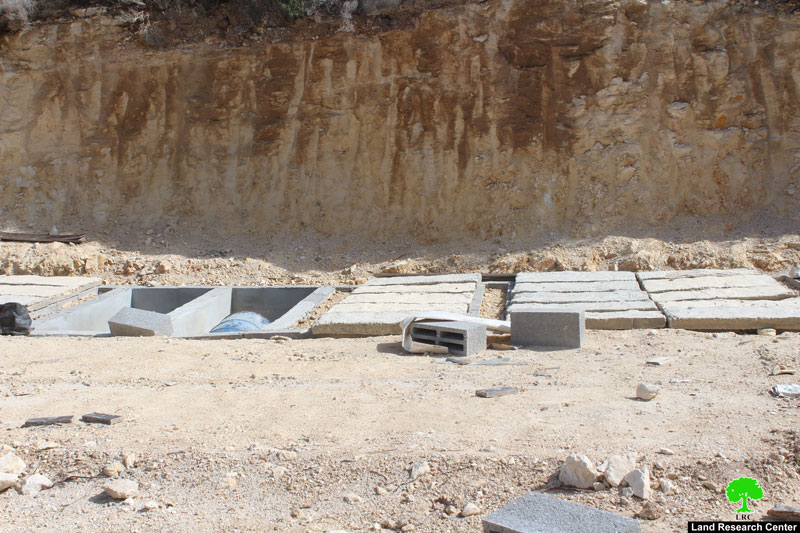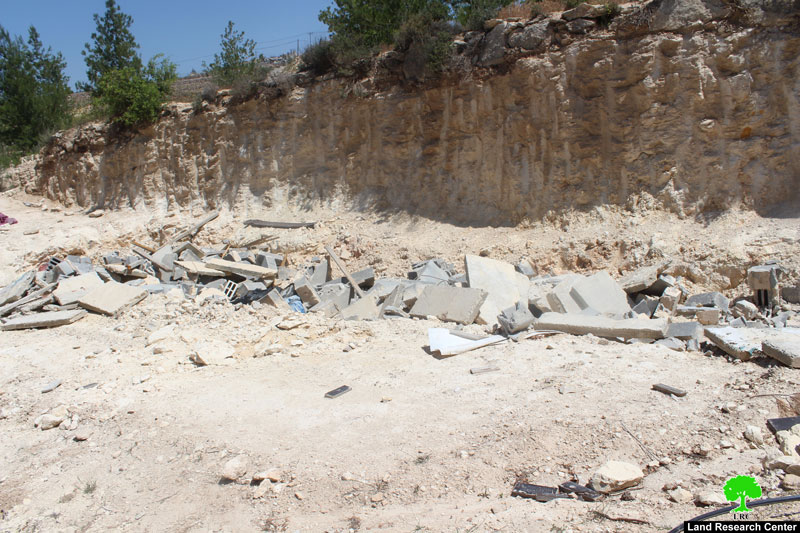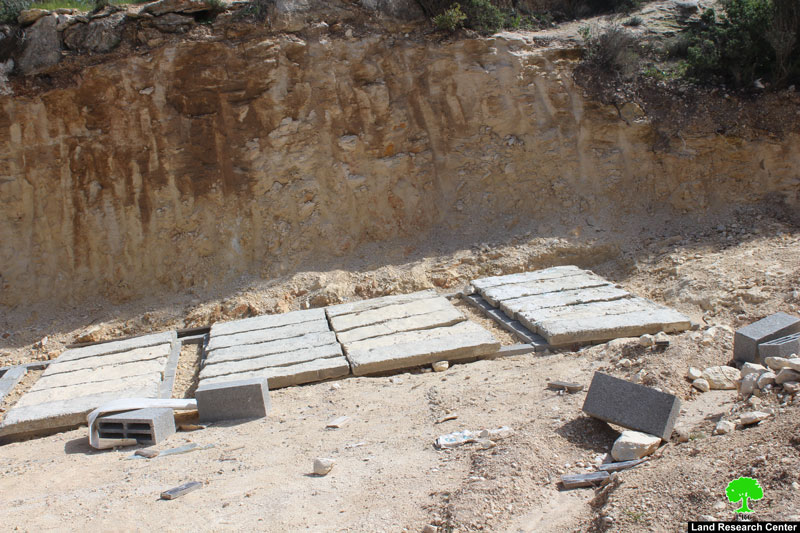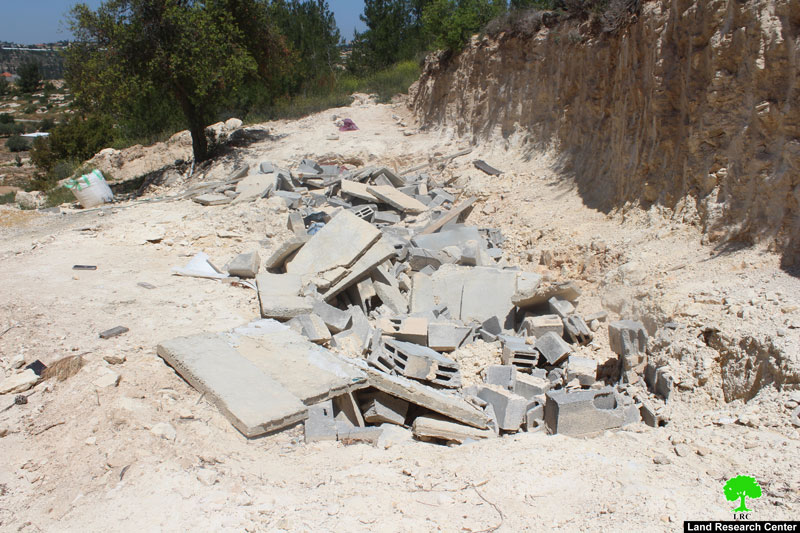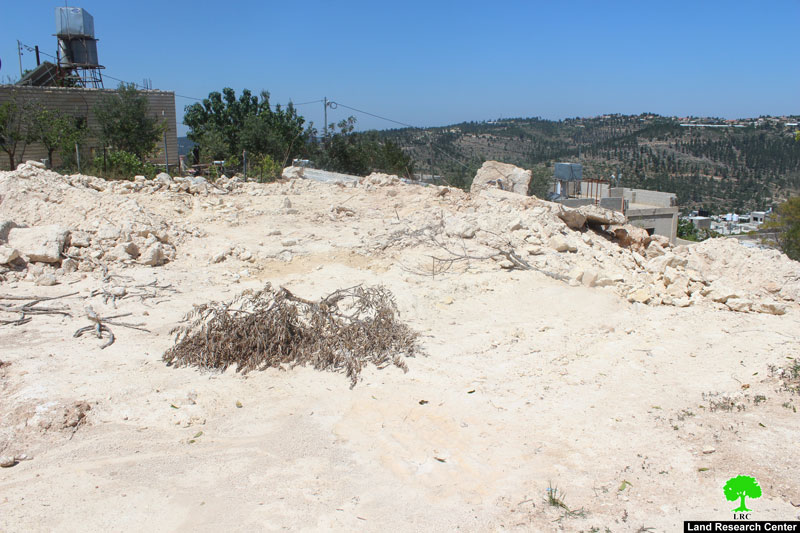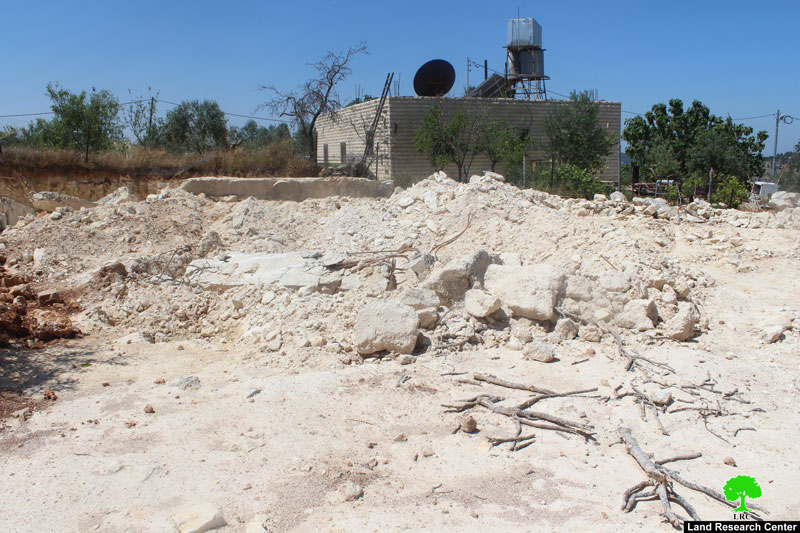2018-03-28
Israeli Occupation Forces Demolish a House and a Cemetery in Al-Walaja, Bethlehem
Violation: demolishing structures
Location: Al-Walaja village- Bethlehem governorate
Date: March 28, 2018
Perpetrators: Israeli Occupation Army
Victims: Nader Abu Khiara, Abed Rabbo, Tariq Mahamid
Details:
Israeli Occupation army forces broke into the area of Ein Jweiza in Al-Walaja village at the early hours of March 28 and then with their bulldozers leveled a house under construction and a supporting wall under the pretext of unlicensed construction.
Not only that, the bulldozers also ravaged a cemetery that consisted of five empty tombs and that belonged to Abed Rabbo family. Given the limited burial space in the village, Abed Rabbo decided to build their private cemetery on a land they owned. The Israeli occupation did not allow it and totally knocked the burial site down after notifying the family about it.
The Israeli bulldozers swept away a land on which a 180m2 house was meant to be built. The land belonged to citizen Nader Abu Khiara and his family who wanted to establish a home on their land.
Ù„.
|
|
|
Destruction of the cemetery
|
|
|
Demolition of the house under construction
Majdi Abu al-Teen from Al-Walaja village council stated to the LRC field researcher that:
"The Israeli occupation seeks to pillage the land of the people of the village of Al-Walaja. The inhabitants of the village are steadfast despite all the suffering and harassment by the occupation forces. Yet, people need to build new structures to accommodate for their increasing needs and growing number of population. They need to provide a decent living for their families and they do not have an alternative but to build on their land inherited by their ancestors.
Residents of Al -Walaja village generally seek to obtain permits from the Israeli side prior to any construction process. However, the Israeli authorities refuse to grant them permits and the same time they do not allow them to use their land and private property. People of Al-Walaja have papers that prove their ownership of the land and they constantly look after it. Since the construction of the Apartheid Wall that surrounds the village, it feels that the inhabitants of Al-Walaja live in an open prison. The occupation authorities control the way people use their land and most of the time prevent them from using it.
It should be noted that everyone has the right to a degree of security and safety in where they live. People should be guaranteed legal protection from forced eviction, harassment and other threats.
The right to housing is included in the human rights charters. Article 25 of the Universal Declaration of Human Rights states: 'Everyone has the right to a standard of living adequate for the health and well-being of himself and of his family, in particular in terms of eating, clothing, housing and medical care."
The Palestinian village of al-Walaja has been undergoing the discriminative policy of the occupation in banning the building movement and demographic expansion. Not only that, this very village suffered from the Apartheid Wall, which confiscated a vast area of its lands.
Al-Walaja [1]:
The village of Al Walaja (diminishing from an area of 17,793 dunums to 2400 dunums due to the greed of the Israeli occupation and its colonial project): From 1948 until today, the Israeli occupation has been practicing land theft on the village of Al-Walaja, 8.5 km southwest of Jerusalem and 5.4 km northwest of Bethlehem. The area of the village was 17793 dunums, of which 11793 dunums were occupied by Israel through the Armistice Agreement with the Jordanian Arab side under British patronage. In 1967, the village of Al-Walaja had 6000 dunums. In 1996, Israeli authorities confiscated 500 dunums of the village for the construction of the bypass road (for settlers). Another 1000 dunums were seized in its southern area for the establishment of the settlement of Gilo over the period of 1969-1997, leaving the village with only4500 dunums of land. That did not stop, the Israeli occupation forces confiscated yet more land by building the Apartheid Wall that looted around 2100 dunums of agricultural land that was planted with olive and almond trees.
[1]: Land Research Centre data
International Conventions and agreements pertaining to house demolition:
The Universal Declaration of Human Rights:
Article 17: " (1) Everyone has the right to own property alone as well as in association with others.
(2) No one shall be arbitrarily deprived of his property."
The 1907 the Hague Convention
Article 23: " In addition to the prohibitions provided by special Conventions, it is especially forbidden to destroy or seize the enemy's property, unless such destruction or seizure be imperatively demanded by the necessities of war."
The Geneva Fourth convention
Article 53: " Any destruction by the Occupying Power of real or personal property belonging individually or collectively to private persons, or to the State, or to other public authorities, or to social or cooperative organizations, is prohibited, except where such destruction is rendered absolutely necessary by military operations."
The International Covenant on Economic, Social and Cultural Rights:
Article 11.1 states: "The States Parties to the present Covenant recognize the right of everyone to an adequate standard of living for himself and his family, including adequate food, clothing and housing, and to the continuous improvement of living conditions. The States Parties will take appropriate steps to ensure the realization of this right, recognizing to this effect the essential importance of international co-operation based on free consent".
The International Covenant on Civil and Political Rights:
Article 1 states: "1. All peoples have the right of self-determination. By virtue of that right they freely determine their political status and freely pursue their economic, social and cultural development.
2. All peoples may, for their own ends, freely dispose of their natural wealth and resources without prejudice to any obligations arising out of international economic co-operation, based upon the principle of mutual benefit, and international law. In no case may a people be deprived of its own means of subsistence.
3. The States Parties to the present Covenant, including those having responsibility for the administration of Non-Self-Governing and Trust Territories, shall promote the realization of the right of self-determination, and shall respect that right, in conformity with the provisions of the Charter of the United Nations."

The contents of this document is the sole responsibility of LRC and can under no circumstances be regarded as reflecting the position of the European Union
